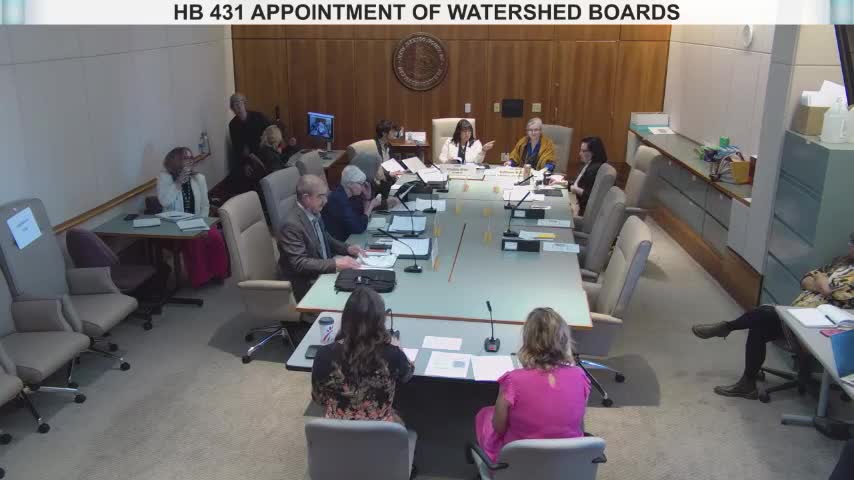House committee gives unanimous do-pass to bill shifting watershed-district oversight to soil and water conservation districts
Get AI-powered insights, summaries, and transcripts
Subscribe
Summary
The House Agriculture and Water Resources Committee voted unanimously to give House Bill 427 a do-pass recommendation after testimony that the measure would clarify governance and financial oversight of small watershed districts by making them subdistricts of soil and water conservation districts and removing them from the local election code.
The House Agriculture and Water Resources Committee on Oct. 12 voted unanimously to give House Bill 427 a do-pass recommendation, advancing a measure that would clarify governance and financial oversight for small watershed districts by treating them explicitly as subdistricts of soil and water conservation districts.
The measure matters because lawmakers and witnesses said the current mix of watershed-district boundaries and local election code has produced places where property owners are taxed by a watershed district but cannot vote for its board, and other watershed districts contain too few residents to form an elected board. Supporters told the committee the bill would place oversight and budgeting responsibility with the parent conservation districts and remove conflicting provisions from the local election code.
Representative Matthews introduced the bill and yielded to Debbie Hughes, identified as executive director of the New Mexico Association of Conservation Districts, who gave historical context. “Soil and water districts were formed over 80 years ago,” Hughes said, and watershed districts — created later and tailored to small flood-protection dams — have in many cases become functionally subordinate to conservation districts. Hughes told the committee some watershed-district boundaries now include very few residents, leaving those residents taxed without voting representation and making it impossible in some places to elect the required board.
Jim Berleer, a registered lobbyist speaking for the state association of Soil and Water Conservation Districts, urged support. “We need to clarify to have oversight how their budgets are run and spent and that they submit budgets to DFA,” Berleer said, referring to the Department of Finance and Administration. Berleer said some watershed districts have been operating autonomously without required oversight.
Witnesses and legislators described how the watershed districts may levy up to 5 mills for operation and maintenance of small dams, and that many of those dams are beyond their 50-year design life and have filled with silt. Hughes said some conservation districts have sought capital outlay from the Legislature to remove silt and extend dam life; she also said federal Emergency Watershed Protection (EWP) funding has been used in New Mexico, noting the state currently has multiple EWP projects underway.
Representative Matthews asked whether the bill would remove watershed districts from the local election code; Hughes confirmed the draft removes watershed-district provisions from the local election provisions and makes the conservation districts responsible for appointments and oversight. Hughes characterized the change as aligning statutory responsibilities so that conservation districts — which she described as political subdivisions with elected supervisors that already must comply with DFA audits and procurement — carry formal responsibility for small watershed districts.
Ranking member Zamora seconded a do-pass motion but asked the sponsor to clarify appointment terms and whether the bill specifies which directors serve two-year versus three-year terms and how a preference for initial appointments would be enforced. Zamora said the issue should be fixed by amendment before the bill proceeds beyond committee. Representative Matthews and others agreed that technical language would be cleaned up in subsequent drafting.
The committee took a role call after the motion. Recorded votes read aloud in committee were: Representative Herrera — yes; Representative Laura Cadena — yes; Representative Matthews — yes; Representative Rubio — yes; Ranking member Zamora — yes; Madam Chair Kate — yes. The committee chair announced a unanimous do-pass recommendation.
The bill advances with committee direction to refine appointment and term language in an amendment. Additional details about proposed statutory citations and exact election-code deletions were discussed in committee testimony but were not read into the record in full; proponents said the draft removes watershed-district language from the local election code and codifies the districts as subordinate to conservation districts for governance, budgeting, and audit purposes.
Votes at a glance: House Bill 427 — Do pass recommendation (mover: Representative Matthews; second: Ranking member Zamora). Vote recorded in committee: 6 yes, 0 no, 0 abstain.
For further consideration, sponsors and witnesses signaled that the bill will return to committee with clarified appointment-term language and that affected conservation districts and watershed districts will remain subject to DFA budget review and audits.
